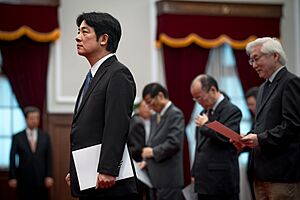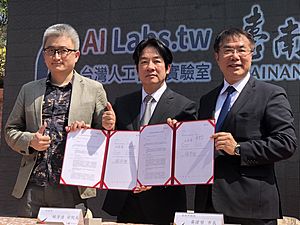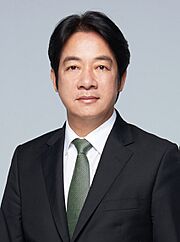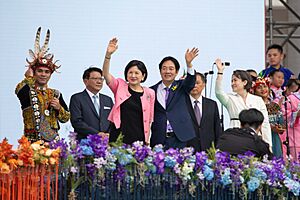Lai Ching-te facts for kids
Quick facts for kids
Lai Ching‑te
|
|||||||||||||||||||||||||||||
|---|---|---|---|---|---|---|---|---|---|---|---|---|---|---|---|---|---|---|---|---|---|---|---|---|---|---|---|---|---|
|
賴清德
|
|||||||||||||||||||||||||||||
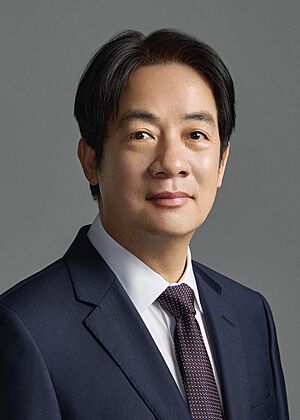
Official portrait, 2024
|
|||||||||||||||||||||||||||||
| 8th President of the Republic of China | |||||||||||||||||||||||||||||
| Assumed office 20 May 2024 |
|||||||||||||||||||||||||||||
| Premier | Cho Jung-tai | ||||||||||||||||||||||||||||
| Vice President | Hsiao Bi-khim | ||||||||||||||||||||||||||||
| Preceded by | Tsai Ing-wen | ||||||||||||||||||||||||||||
| 18th Chairman of the Democratic Progressive Party | |||||||||||||||||||||||||||||
| Assumed office 18 January 2023 |
|||||||||||||||||||||||||||||
| Secretary General | Hsu Li-ming Yang Yi-shan (acting) Lin Yu-chang |
||||||||||||||||||||||||||||
| Preceded by | Chen Chi-mai (acting) | ||||||||||||||||||||||||||||
| 12th Vice President of the Republic of China | |||||||||||||||||||||||||||||
| In office 20 May 2020 – 20 May 2024 |
|||||||||||||||||||||||||||||
| President | Tsai Ing-wen | ||||||||||||||||||||||||||||
| Preceded by | Chen Chien-jen | ||||||||||||||||||||||||||||
| Succeeded by | Hsiao Bi-khim | ||||||||||||||||||||||||||||
| 26th Premier of the Republic of China | |||||||||||||||||||||||||||||
| In office 8 September 2017 – 14 January 2019 |
|||||||||||||||||||||||||||||
| President | Tsai Ing-wen | ||||||||||||||||||||||||||||
| Vice Premier | Shih Jun-ji | ||||||||||||||||||||||||||||
| Preceded by | Lin Chuan | ||||||||||||||||||||||||||||
| Succeeded by | Su Tseng-chang | ||||||||||||||||||||||||||||
| 1st Mayor of Tainan | |||||||||||||||||||||||||||||
| In office 25 December 2010 – 7 September 2017 |
|||||||||||||||||||||||||||||
| Deputy | Hsu He-chun | ||||||||||||||||||||||||||||
| Preceded by | Position established | ||||||||||||||||||||||||||||
| Succeeded by | Li Meng-yen (acting) | ||||||||||||||||||||||||||||
| Member of the Legislative Yuan | |||||||||||||||||||||||||||||
| In office 1 February 2008 – 25 December 2010 |
|||||||||||||||||||||||||||||
| Constituency | Tainan II | ||||||||||||||||||||||||||||
| In office 1 February 1999 – 31 January 2008 |
|||||||||||||||||||||||||||||
| Constituency | Tainan City | ||||||||||||||||||||||||||||
| Personal details | |||||||||||||||||||||||||||||
| Born | 6 October 1959 Wanli, Taipei County, Taiwan (now Wanli, New Taipei City, Taiwan) |
||||||||||||||||||||||||||||
| Political party | |||||||||||||||||||||||||||||
| Spouse |
Wu Mei-ju
(m. 1986) |
||||||||||||||||||||||||||||
| Children | 2 | ||||||||||||||||||||||||||||
| Education | |||||||||||||||||||||||||||||
| Signature | |||||||||||||||||||||||||||||
| Chinese name | |||||||||||||||||||||||||||||
| Traditional Chinese | 賴清德 | ||||||||||||||||||||||||||||
| Simplified Chinese | 赖清德 | ||||||||||||||||||||||||||||
|
|||||||||||||||||||||||||||||
Lai Ching-te (born October 6, 1959), also known as William Lai, is a Taiwanese politician and former doctor. He became the eighth President of the Republic of China (Taiwan) in 2024. He is a member of the Democratic Progressive Party (DPP) and has also been the chairman of the party since 2023.
Lai grew up in a working-class family in Taiwan. He studied medicine at National Taiwan University and National Cheng Kung University. Later, he earned a master's degree from Harvard University in 2003. After working as a doctor, Lai decided to enter politics. He was first elected to the Legislative Yuan (Taiwan's parliament) in 1996. He served there for many years.
In 2010, Lai became the Mayor of Tainan, a major city in Taiwan, and was re-elected in 2014. He served as mayor for seven years. In 2017, he was appointed as the Premier (like a prime minister) by then-President Tsai Ing-wen. He served as Premier until 2019.
Lai later became the running mate for President Tsai Ing-wen in the 2020 presidential election. They won, and he served as Vice President from 2020 to 2024. In 2023, he was chosen as the DPP's presidential candidate for the 2024 election. He won the election and became President on May 20, 2024.
Contents
Early Life and Education
Lai Ching-te was born on October 6, 1959, in Wanli, a coastal town in what was then Taipei County (now New Taipei City). His father worked in a coal mine and sadly passed away in 1960 due to a gas leak. Lai's mother raised him and his five siblings by herself.
Lai attended Wanli Junior High School and was the first student from his school to get into Taipei Municipal Chien Kuo High School, a top high school for boys in Taipei. After high school, he went to National Taiwan University to study veterinary medicine, but later switched to physical medicine and rehabilitation, earning a bachelor's degree in 1984. He worked as a tutor to help pay for college.
After serving in the military, Lai continued his medical studies at National Cheng Kung University in Tainan, where he earned a medical degree in 1991. He then went to the United States and earned a master's degree in Public Health from Harvard University in 2003. He also worked as a visiting scholar at the U.S. Department of State in 2004. His medical focus was on spinal cord injuries.
Becoming a Politician
After helping with a political campaign in 1994, Lai decided to leave his medical career and enter politics. His first political role was in 1996 when he won a seat in the National Assembly, representing Tainan City.
He then joined the Democratic Progressive Party (DPP) and was elected to the Legislative Yuan (Taiwan's main law-making body) in 1998. He was re-elected three more times, serving a total of 11 years as a legislator. During this time, he was recognized as Taiwan's "Best Legislator" four times in a row by a group called Citizen Congress Watch.
Mayor of Tainan (2010–2017)
In 2010, Tainan City and Tainan County joined together to form a larger city called Tainan. Lai Ching-te was chosen as the DPP candidate for mayor. He won the election on November 27, 2010, with a large majority of the votes. He officially became mayor on December 25, 2010.
Because of his strong performance and popularity, many people thought Lai might become a future presidential candidate. In 2013, a survey showed that he was the most popular city or county leader in Taiwan, with an approval rating of 87%. He was re-elected as Mayor in 2014 with an even larger margin of victory. Lai stepped down as Mayor in September 2017 when he was appointed as the Premier.
Premier of Taiwan (2017–2019)
In September 2017, the Premier at the time, Lin Chuan, resigned. President Tsai Ing-wen then announced that Lai Ching-te would be the country's next Premier. Lai took office on September 8, 2017. After he became Premier, President Tsai's approval ratings went up significantly.
As Premier, Lai stated that he believed Taiwan was already an independent country called the Republic of China and did not need a separate declaration of independence. He also suggested that Taiwan should be "close to China while loving Taiwan." In October 2017, a survey showed that 68.8% of people approved of his work as Premier.
In November 2018, Lai offered to resign after the DPP did not do well in local elections. He stayed on for a short time to help the government, and then officially left office on January 14, 2019. Su Tseng-chang became the new Premier.
Journey to the Presidency
In March 2019, Lai Ching-te decided to run for president in the DPP's primary election. This was unusual because he was challenging the sitting president, Tsai Ing-wen. However, Tsai won the primary election in June 2019.
Later, in November 2019, Lai agreed to become President Tsai's running mate for the 2020 presidential election. They won the election with a record number of votes, and Lai became the Vice President in 2020.
Vice Presidency (2020–2024)
As Vice President, Lai Ching-te represented Taiwan on important international trips. For example, he was President Tsai Ing-wen's special envoy to Honduras for a presidential inauguration in January 2022. He also made a private trip to Tokyo to pay respects after the assassination of former Japanese prime minister Shinzo Abe, which was a significant visit for a high-ranking Taiwanese official. In November 2022, he visited Palau to help build stronger connections between the two countries.
In November 2022, President Tsai resigned as the leader of the DPP after the party lost many local elections. Lai then ran for the position of DPP chairman and became the new chairman in 2023, as he was the only candidate.
2024 Presidential Campaign
In March 2023, Lai was the only person to run in the DPP's presidential primary for the 2024 election, and he was officially nominated as the party's candidate in April. On November 21, 2023, he officially registered his campaign with his running mate, Hsiao Bi-khim.
Lai won the election on January 13, 2024, making it the first time a political party in Taiwan had won three presidential terms in a row since direct elections began in 1996. However, the DPP did not win a majority of seats in the legislative election.
Presidency (2024–Present)
Lai Ching-te was elected President of the Republic of China on January 13, 2024, and was officially sworn into office on May 20, 2024. He appointed Cho Jung-tai, a former chairman of the DPP, as the new Premier.
Under President Lai, Taiwan has continued to strengthen its relationships with countries in Southeast Asia through the New Southbound Policy. For example, Taiwan signed an investment agreement with Thailand in June 2024.
President Lai has stated that the Republic of China (Taiwan) and the People's Republic of China are separate and do not belong to each other. He has emphasized Taiwan's independence and its commitment to resisting pressure from Beijing. He has also expressed hope for discussions with Beijing, even with ongoing tensions. In 2025, he announced plans to bring back military trials for active-duty soldiers and called China a "foreign hostile force" under the Anti-Infiltration Act.
Political Views
In the past, Lai was known for supporting Taiwanese independence. As Mayor of Tainan, he called himself a "pragmatic worker for Taiwanese independence." He also said it was possible to "love Taiwan while having an affinity to China."
Since then, he has softened his stance, saying there is no need to declare independence because "Taiwan is already a sovereign, independent country called the Republic of China." Lai believes in making Taiwan's relationships with the United States and other democratic countries stronger. He also thinks that both "Taiwan" and "Republic of China" can be used to refer to the country.
Personal Life
Lai Ching-te married Wu Mei-ju in 1986. His wife worked for a power company and moved to Kaohsiung when Lai became mayor of Tainan. They have two sons. Lai's first grandson was born in the United States in 2020.
Honors
See also
 In Spanish: Lai Ching‑te para niños
In Spanish: Lai Ching‑te para niños
 | Lonnie Johnson |
 | Granville Woods |
 | Lewis Howard Latimer |
 | James West |


